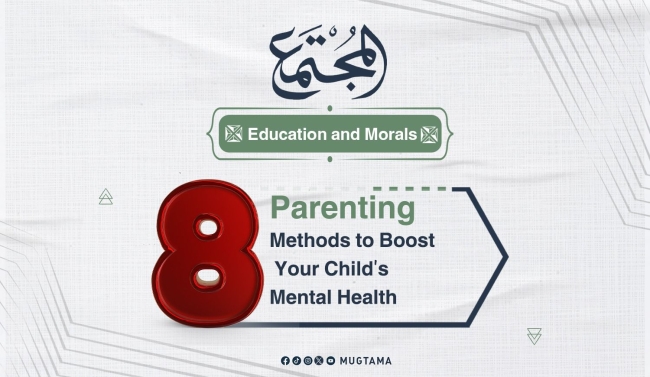8 Parenting Methods to Boost Your Child’s Mental Health
Parenting styles vary from one family to another, and parents may adopt conflicting approaches during the parenting process, which can lead to behavioral disorders in their child and negatively affect them, potentially creating a weak personality that is psychologically and mentally unstable, ultimately harming their future.
Many parents make the grave mistake of neglecting to familiarize themselves with positive parenting theories and failing to follow programs aimed at developing their child’s abilities and skills. They also succumb to unhealthy methods, without keeping pace with the immense technological development and the growing need for intelligent and mature parenting that matches the pressures and challenges children face during childhood and adolescence.
1. Experts’ Recommendations on Avoiding Punishment and Negative Behavior:
Educational experts advise avoiding frequent punishment, yelling, hitting, or inflicting physical and psychological harm on the child, as well as bullying and mocking them or comparing them to their peers. Instead, it is recommended to use praise and compliments to build their self-confidence through positive feedback that instills belief in their abilities and drives them toward success and achievement.
Experts also suggest that praise should be directed at good actions, not just the child. Otherwise, the child may become overly confident and lose motivation to continue good behavior. For example, instead of saying, “You are a genius,” one might say, “You’ve become really good at solving this problem.” Praise should become a daily habit and a consistent parenting practice.
2. The Importance of Listening and Understanding:
In an interview with Al Jazeera, psychologist Olga Subra emphasizes the importance of listening to children, understanding their emotions and needs, and sharing their dreams and aspirations, even if they seem simple or imaginary. This approach gives the child a sense of self-worth, which is an invaluable emotional recognition that assures them of their importance to their parents and their ability to achieve their dreams and solve problems in the future.
3. Using Consequences Instead of Punishment:
Scientific studies confirm that the “consequence” method, rather than punishment, is one of the most effective ways to discipline children. This means assigning a logical consequence for every misbehavior. For example, if a child leaves toys scattered on the floor, the toys can be taken away for the day. Or, if they neglect their homework, they lose their playtime. The idea is to provide logical outcomes for their actions without exaggeration or verbal or physical punishment.
4. Encouraging Independence:
Building a child’s confidence involves fostering self-reliance, such as eating independently, dressing themselves, taking a bath, and tidying their room. These practices have a long-term impact on the child’s personality, turning them into an independent individual capable of collaborating with others, taking responsibility for their actions, and fulfilling their obligations, rather than being dependent on others.
5. Establishing Clear Family Rules:
In her book Positive Discipline, author Jane Nelsen advises setting clear rules and principles within the family, without discrimination among children. She notes that such structure brings comfort and security to the child when rules are respected by all family members. She also emphasizes the importance of regular family meetings, fostering mutual respect, and cultivating a culture of apology when mistakes are made.
6. Maintaining a Regular Routine:
Maintaining a consistent routine at home, starting with early wake-up times, group prayers, making beds, brushing teeth, and having breakfast, instills a sense of discipline and order in the child. It helps them develop planning skills and prioritize tasks, ultimately teaching them life skills and appropriate social behaviors.
7. Setting Boundaries to Support Positive Behavior:
Establishing boundaries enhances the effectiveness of parenting and ensures things remain under control. It is essential to understand the root cause of misbehavior and address it without excessive punishment, using positive parenting techniques such as advice, guidance, and explanation.
8. Role Models as a Learning Tool:
Providing a positive role model gives the child a clear path to follow and offers one of the most effective ways of learning through observation. Children learn by watching and imitating their parents' actions and behavior. Therefore, parents should strive to be exemplary figures. For instance, rather than instructing the child to perform certain acts, such as giving charity or maintaining family ties, parents can model these behaviors themselves. This method is considered one of the most effective forms of positive parenting.
-------------------------------------------------------------


